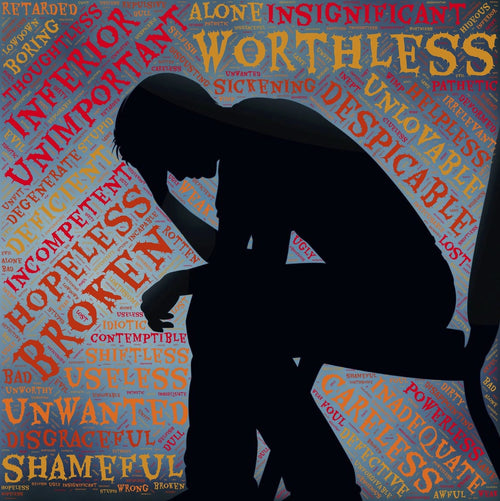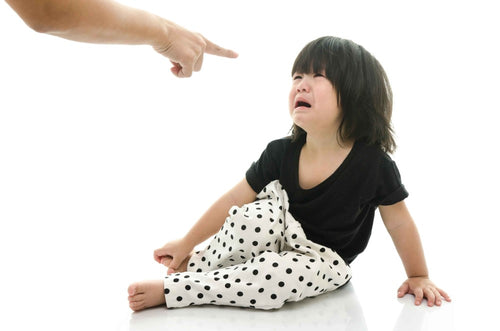What does a child experience when you shame them?
AN INTIMATE LOOK INTO THE SILENT KILLER OF YOUR CHILD’S DREAMS
By Karen Braveheart


As parents, we want our children to be happy. The main ingredient to a happy life is self worth.
Shame only brings suffering and low self worth.
So, why is our current parenting model built around shame?
Definition of shame
Brene Brown, a researcher at the University of Houston, defines shame as an "intensely painful feeling or experience of believing that we are flawed and therefore unworthy of love and belonging." It's an emotion that affects all of us and profoundly shapes the way we interact in the world.
People who feel shame think of themselves as "I'm bad at my core" or "I'm not worthy of receiving love". This is often reinforced by messages and information received by others, including parents, during early childhood that get stored in your subconscious brain.
Unlike guilt, which is a reaction to what you do, shame is a negative reaction to how you see yourself as a person.
Definition of self worth
The core of what is most affected by shame is our self worth.
Self worth is believing in ourselves, our dreams, and that we deserve a happy life. It's feeling empowered and confident on life's journey to continuously make choices to be happy. It's the root of personal will and the subconscious self.
What is shame based parenting?
Shame-based parenting is an extremely strict parenting style. It places high expectations on how a parent thinks their child should act.
An authoritarian parent focuses more on punishment and control, rather than nurturing their child.
Many parents use physical punishment or harsh words, telling their child they're bad because they think it works. A parent observes the child's reaction in the short term—the child is upset and stops the behavior—so they conclude it is an effective teaching tool.
Shame is designed to cause children to curtail behavior through negative thoughts and feelings about themselves. It involves a comment- direct or indirect- about what the child is.
Shaming operates by giving children a negative image of themselves- rather than focusing on the impact of their behavior or choices.
An example of shame based parenting
A few years ago, I was standing in the checkout line at Rite Aid with my kids and saw a dad hit his young son, who was about 3 years old. Why did this beautiful child get spanked in front of everyone in the store?

The little boy saw all the candy displayed near the front registers and impulsively ran up to grab some. His eyes beamed with natural curiosity and his sense of adventure at his new discovery.
I saw his face light up with happiness.
The dad hurriedly rushed over and spanked him, and told him he was bad.
The look of hurt and pain on this boy's face broke my heart.
The father then picked up his son in anger put him in the front part of the shopping cart (and we all know how hard that can be when a child doesn't want to put their feet into the 2 slots!). Then, he got in line to check out and was behind me.
The boy was crying his eyes out and looked to his dad for emotional comfort. He was ignored. I was watching them to see if he was going to hit his son again.
I thought to myself: How would this father feel if someone hit him and called him bad? I think he'd be pissed

So, why did he hit his beautiful boy and tell him he was bad?

What happens when you shame a child as told from a child's perspective?
I can tell you what this little boy was thinking and feeling after he got hit and told he was bad because I was that kid.
My dad was abusive, and my mom was neglectful. In my child's brain, it made me think I was bad. That who I am as a person was bad- deep inside my core.
This is shame and these thoughts of low self worth were formed during my childhood and stored in my subconscious brain as a child. I felt I didn't deserve to be loved.
This showed up as me rejecting myself in all areas of my life- in a career choice where I didn't feel 100% fulfilled, being in relationships that were less than what I deserved, and desperately looking for love outside of myself.
It wasn't until I made a choice to live a happy life and started healing the shame and unworthiness within me that I was able to turn my life around and create joy in my life.
If you'd like to learn exactly how shame affects your child, read our blog.
Why shame based parenting is broken
The purpose of this blog is not to judge this father or any other parent that treats their kid this way.
"I am here to speak up for all children and tell you that there's a much better way to raise our children that leads to happiness and a lot less stress for parents"
Research shows that spanking, slapping, and other forms of physical punishment don't work well to correct a child's behavior... Beyond being ineffective, harsh physical and verbal punishments can also damage a child's long-term physical and mental health.
This type of parenting style leads to

Children who are shy, aggressive, socially inept, and unable to make their own decisions

Children in these families grow into adults with low self worth, are poor judges of character, and will rebel against authority figures when they are older

If we look closely at addictions, depression, narcissistic personality disorder, other mental health issues and disorders, and unhappiness in life due to toxic relationships and career choices, shame is at the root of all of these

Shaming makes children feel like they cannot change.
Rather than motivating them, it may make them feel like they aren't capable. Unfortunately, it succeeds in making children feel bad and unworthy about themselves.
How shame based parenting neurologically leads to suffering as an adult
A child is not someone to be trained to obey rules or punished as a way to correct disobedience. This old way of thinking leads to unhappiness and suffering in adulthood.
Your child's brain is built from birth. It's the most powerful organ in our body, yet our society doesn't tell parents how critical it is to raise our child's brain with positive self worth from birth. 95% of all adult behavior comes from how your brain is formed in the first 5 years of your life.
In early childhood, more than 1 million new neural connections are formed every second. During this period of rapid development, sensory pathways like those for basic vision and hearing are the first to develop, followed by early language skills and higher cognitive functions.
A baby wires together emotional experiences. Early experiences are so powerful because, according to the
A child's brain doesn't have the capacity to process logic yet, so children can only understand things through emotional experience.

What do you think wires together if the experience is negative? For example, you don't return your baby's toy with soft words and a smile. Instead, you are angry, and your tone of voice reflects this.
You're mad that you have to pick up the toy that they dropped. This happens over and over again.
A baby's experiences determine whether a child grows up to be intelligent or not, fearful or self-assured, articulate or tongue-tied.

The father in the grocery store likely didn't know how his son's brain is built and how his shame based punishing treatment has a lifelong negative impact on his son's life. If this dad knew how this negatively affected his son's brain, do you think he'd repeat his behavior?
"We need to change this model to be built around self worth if we want a world full of alive, connected people that are living their dreams, creating a better world"
It's our job as parents to create this world inside their brain through loving interactions that are rich with positive neuron wiring patterns.
We pioneered a better way!
Prodigi Kids Self Worth Parenting Paradigm
Moving away from shame based parenting is not just better for our children and our societies, it's better for us too!
We owe it to ourselves to find ways to move beyond the traditional parenting models based on shame and control and find new ways to connect with our children in love.
The Prodigi Kids Self Worth Parenting Paradigm teaches parents how to parent with love and discipline- never punishment or shame. We're creating a world where we raise our children with self worth- to teach them how to live a happy life by achieving their dreams and creating a positive impact.
Practical Tips
- It starts with your choice- If this blog resonates with you, and you'd like to make a change in the way you parent your child, that's huge! Once you make a choice, you need to commit to it 100%
- Take the time to think about how you parent in moments of stress with your child. How do you react? What is the tone of your voice and what do you say? Most importantly, really look at your child- what is their emotional reaction to what you're saying and doing in a stressful parenting moment
Resources
- To learn more about the Prodigi Kids Self Worth Parenting Paradigm, read our free eBook. It’s divided into 3 sections: Align, Develop, and Interact. You’ll gain a deeper understanding about how to raise your child with core beliefs of self worth and the neuroscience behind it
- Read our blog "Discipline vs. Punishment," which does a deeper dive into exactly how our model built on love and discipline builds positive self worth. In it, I discuss how "teachable moments" and "love boundaries"- 2 terms I coined and when used daily with your child, lead to happier, healthier, and more connected relationships
- Bring our products into your home to encourage a more loving engagement with your children and support our mission to make our Self Worth Parenting Paradigm the norm!
Share this blog
Table of Contents
1. Definition of shame
2. Definition of self worth
3. What is shame based parenting?
4. An example of shame based parenting
5. Why shame based parenting is broken
6. How shame based parenting neurologically leads to suffering as an adult
7. We pioneered a better way! Prodigi Kids Self Worth Parenting Paradigm
8. Practicle Tips & Resources
0 comments
write a comment
About the Author Karen Braveheart, CEO
Karen Braveheart is an attorney turned entrepreneur and mom of three who deeply cares about making the world a happier place by changing how we raise our children. Learn more
all kids are Prodigi Kids!

